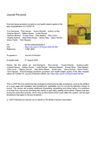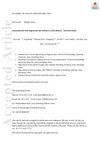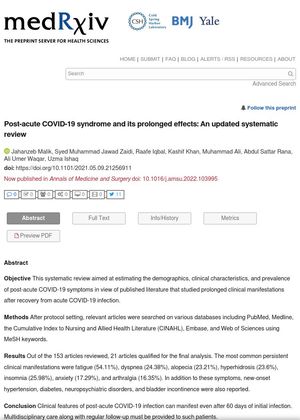TLDR Long-lasting COVID-19 symptoms like fatigue and breathing difficulties can persist for over 60 days, requiring ongoing care.
This systematic review analyzed 21 articles out of 153 to estimate the demographics, clinical characteristics, and prevalence of post-acute COVID-19 symptoms. The study found that even after 60 days of initial infection, patients can still experience symptoms such as fatigue (54.11%), dyspnea (24.38%), alopecia (23.21%), hyperhidrosis (23.6%), insomnia (25.98%), anxiety (17.29%), and arthralgia (16.35%). Additionally, new-onset hypertension, diabetes, neuropsychiatric disorders, and bladder incontinence were reported. The authors concluded that multidisciplinary care and regular follow-up are necessary for patients experiencing these prolonged effects of COVID-19.
 737 citations
,
August 2020 in “Journal of Infection”
737 citations
,
August 2020 in “Journal of Infection” Many COVID-19 survivors experience long-term symptoms but still report satisfactory quality of life and return to work.
 51 citations
,
September 2015 in “Medical Clinics of North America”
51 citations
,
September 2015 in “Medical Clinics of North America” The conclusion is that acne, alopecia, and hyperhidrosis are common skin issues with various treatments available, and accurate diagnosis is key for effective management.
 14 citations
,
December 2007 in “Journal of The European Academy of Dermatology and Venereology”
14 citations
,
December 2007 in “Journal of The European Academy of Dermatology and Venereology” The article concludes that dermatologists should prescribe lifestyle drugs carefully and consider mental health treatments for patients with disorders like BDD.
 1 citations
,
November 2008 in “Gerontology”
1 citations
,
November 2008 in “Gerontology” Older adults use lifestyle drugs to improve life quality and appearance, but caution is needed due to side effects and potential abuse.
 18 citations
,
August 2019 in “Journal of Cosmetic Dermatology”
18 citations
,
August 2019 in “Journal of Cosmetic Dermatology” PRP therapy may increase hair density in pattern hair loss without serious side effects, but more research is needed.
 5 citations
,
July 2018 in “Experimental Dermatology”
5 citations
,
July 2018 in “Experimental Dermatology” The "Punch Assay" can regenerate hair follicles efficiently in mice and has potential for human hair regeneration.
 2 citations
,
January 2020 in “International Journal of Medical Sciences”
2 citations
,
January 2020 in “International Journal of Medical Sciences” Avoid alcohol, ponytails, and oily scalp, and get good sleep to prevent severe hair loss.







